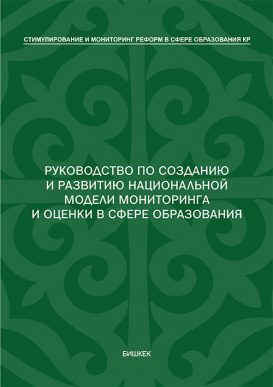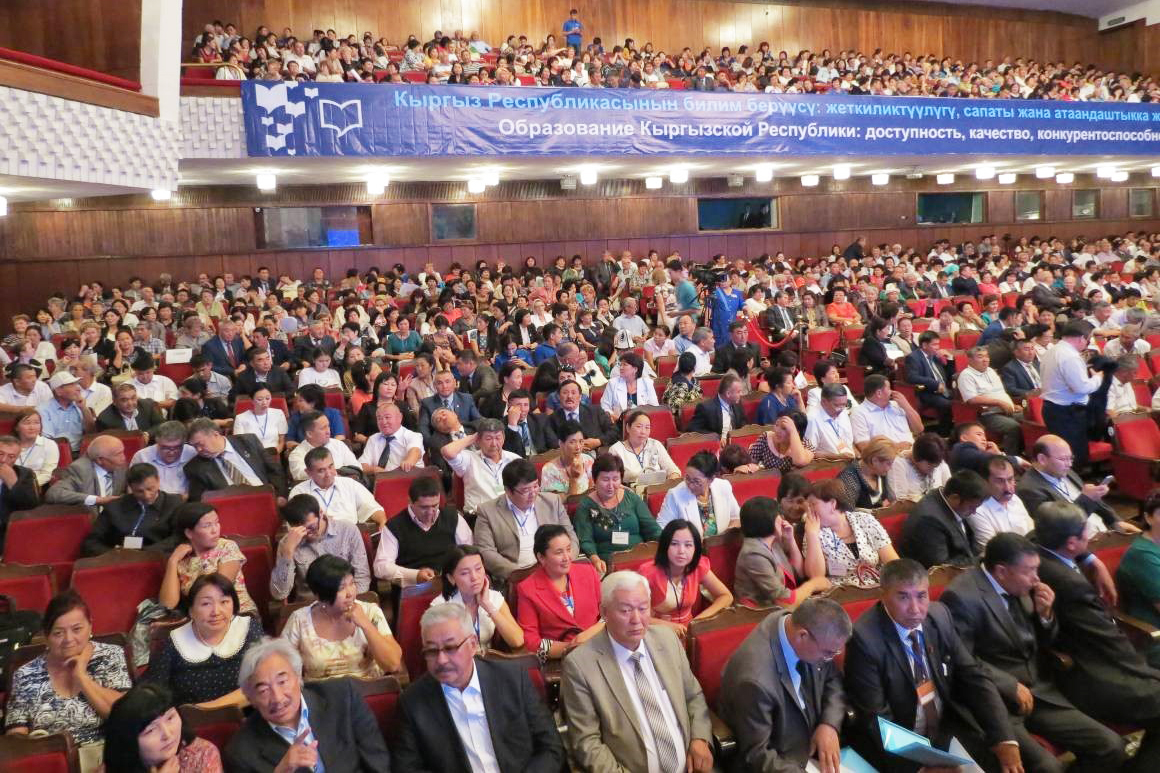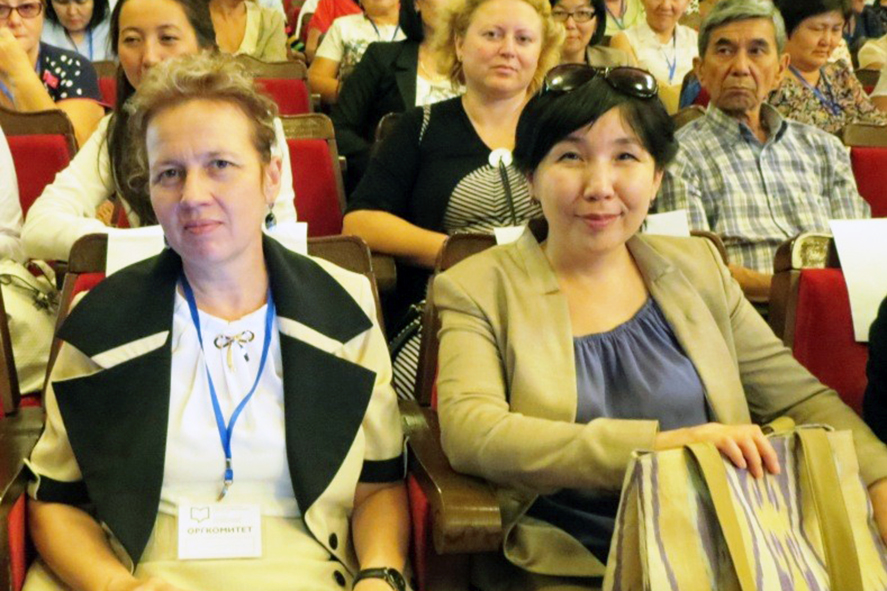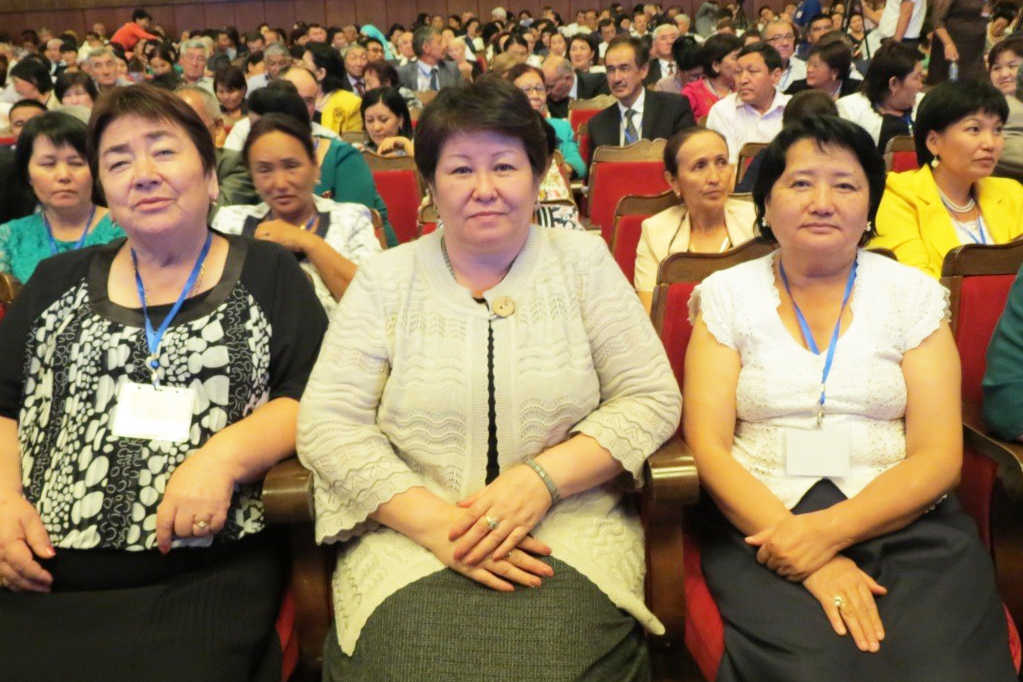This important event was held in the National Philharmonic Hall on August 26-28, 2015 to discuss current issues and to make proposals for reforming the education sector with the participation of the country’s top leadership, KR MES and teachers from all regions of Kyrgyzstan, expert and scientific community.
The coordinators of the Project “Promotion and monitoring of education reform in Kyrgyzstan”, which has been implemented in the Kyrgyz Republic since the beginning of the year, did not keep out of this event. On the contrary, they have redoubled efforts to deal with educational policy and are cooperating closely with the Ministry of Education of the Kyrgyz Republic on formation of human resources – main wealth of our country.
11 breakup groups united to 5 blocks worked at the seminar. Among other things, members of the Project “Promotion and monitoring of education reform in Kyrgyzstan” took part in work of breakup groups. One of the leaders of the breakup group of the block – Partnership in Education, breakup group – 4 on areas of “Education of Students: family partnership, schools, communities”, “Potential of multilingual education for integration of society” was Zamira Kasymbekovna Derbisheva. One of the leaders of the breakup group 10 on “Pedagogical education” in the block “Competitiveness of Professional Education and Science” was Svetlana Rustamovna Sirmbard.
One of the leaders of the block “Innovations in preschool and school education”, breakup group – 7 in the direction of “Development of innovative schools as a new form of education and management organization” and Management of innovative activity in educational institutions” was Larisa Yuryevna Marchenko.
Svetlana Rustamovna Sirmbard was also a co-head in the block – Innovative development – for competitiveness of professional education and science, sections 8-10 to the subject of “Standards of a new generation of NGOs, SVE, HVE and (independent) institutions for assessment of quality and accreditation (KNU)”.
There are currently 1062 kindergartens, 2207 schools, 101 vocational and technical institutions and 55 universities in Kyrgyzstan. 1 529 000 students and more than 100 thousand teachers study and work in those institutions.
However, according to experts, the current situation in the field of national education causes conflicting emotions in Kyrgyz people. On the one hand, education expenditures are increasing each year under limited government resources: they have grown from 12.5 billion KGS/year to 25.4 billion KGS/year only over the last 5 years. And this is nothing less than 23.4% or the fourth part of the total national budget. “No country in the world invests such percentage of budgetary funds into education” – stated A. Atambaev. On the other hand, to be a teacher is becoming less prestigious and the quality of education is declining.
In this regard, it was announced at the Congress that educational reforms were urgently needed to educate a new citizen of Kyrgyzstan, i.e., “intellectually and physically developed, educated, health, fluent in several languages, happy and successful person”. Their leading figure is teacher.
In order to make the teacher’s profession more prestigious in Kyrgyzstan, the first step will be increasing the salary since the 1st of September this year through increasing the base rate of payment per hour of teaching. The salary will rise to 50% for the majority of teachers and to 80% for teachers of lower grades. 2.2 billion KGS will be allocated in addition in 2015 to increase salary of teachers; this amount will make 6.6 billion KGS in 2016!
On the eve of the congress, in June, the Government of the Kyrgyz Republic adopted a program “Safe schools and pre-school organizations for 2015-2024”, according to which every year 200 school buildings and 80 buildings of kindergartens will be renovated both through new construction and through reconstruction and capital repairs due to funds from the national budget under the item “Capital investments”.
The approved list has currently included 230 educational facilities. According to Prime Minister Temir Sariev, there will be built and opened 66 new buildings instead of those that have already served their time and become unsafe. The Prime Minister noted that the government was dealing with returning of illegally privatized kindergartens, which resulted in returning of 119 kindergartens.
It was noted during the Congress that about 80 thousand children did not go to school or study partially. According to data of KR MES, only 13.4% of 3-6 years old of children throughout the country are covered by preschool education. For comparison, preschool education coverage ratio in the Republic of Kazakhstan is 45%, in Ukraine – 49%, in Russia – 58% and in the Republic of Belarus – 100%. Today, there has been introduced 480 hours preschool education program as well. The Government is planning to allocate additionally 60 million KGS for that purposes.
The Congress set a task to improve education quality. At the initiative of the KR MES, the Government has already adopted a new State educational standard built based on definition of key competences of students, which completely changes general approaches to education of children and ensures readiness of a person to successful activity in social and professional spheres. The new standard requires updating of Basic Curriculum, in which each subject will be given at least 2 hours and the focus is drawn to strengthening of teaching students to natural sciences. Accordingly, it changes the policy of development and publication of textbooks in terms of greater access and choice, especially to electronic free versions. For that purpose there were approved bilateral and trilateral formats of agreements between authors, publishers and KR MES on subsequent delegation of copyrights to the Ministry of Education. At present schools are supplied with textbooks to 75.1%, it is planned to bring this figure to 78% in the near future.
According to the KR MES that standard will also link career progression with receipt of additional salary increments. Thus there will be created objective system will be created inside the school education system, which will set barrier for the worst and motivate the best in profession.
Congress participants set so on pressure points. Start to positive changes has been given.














